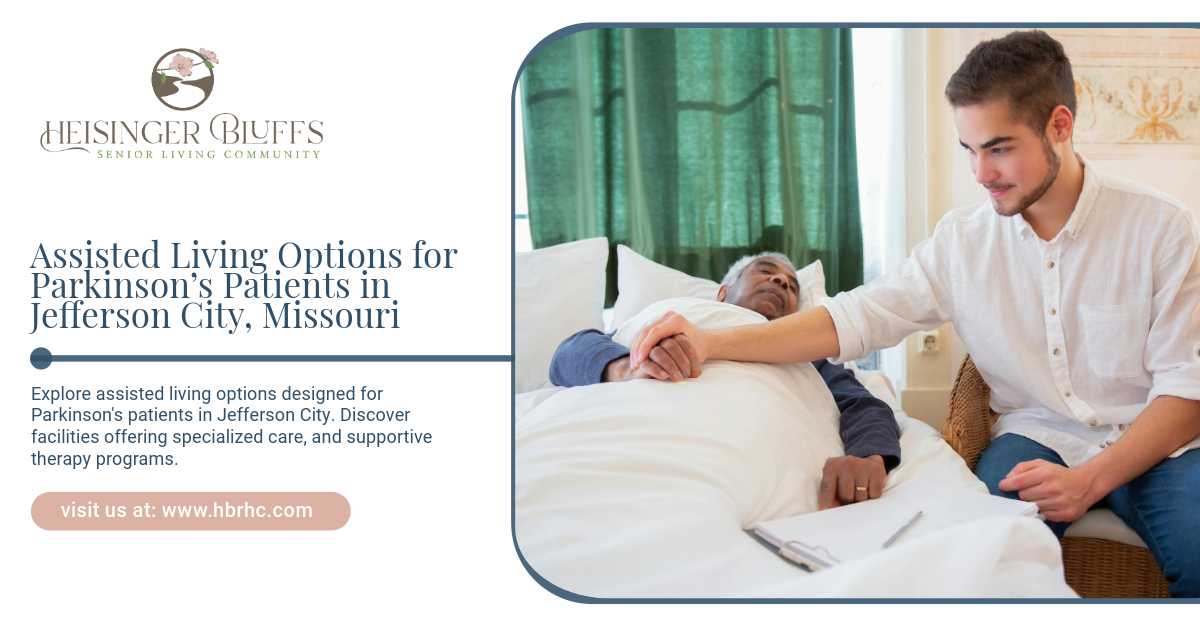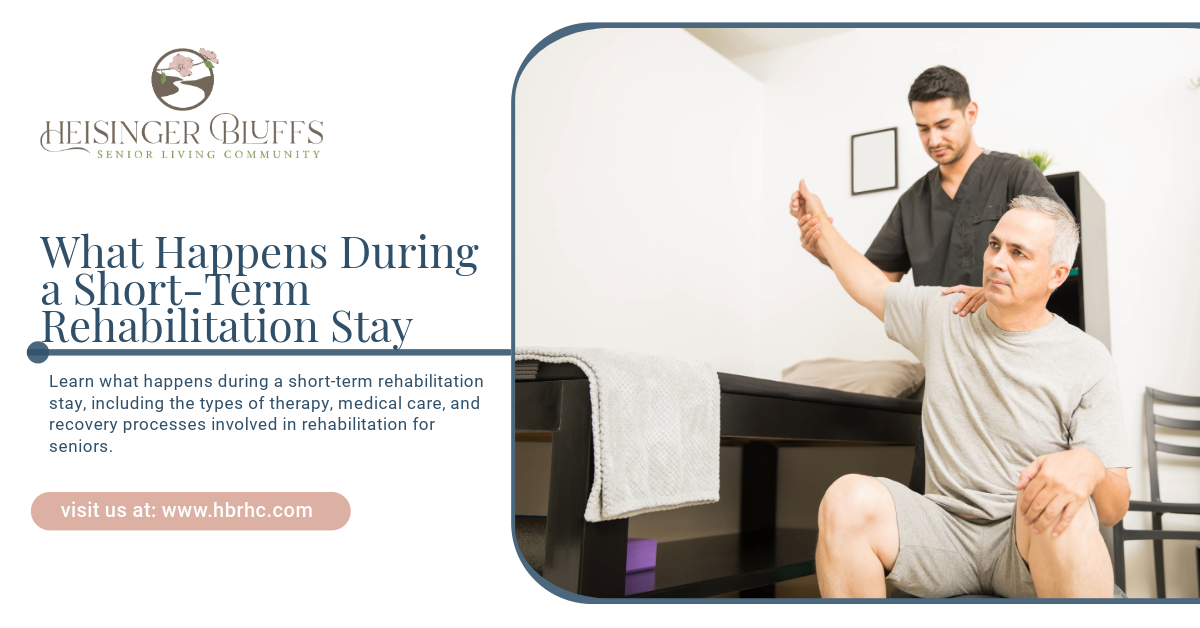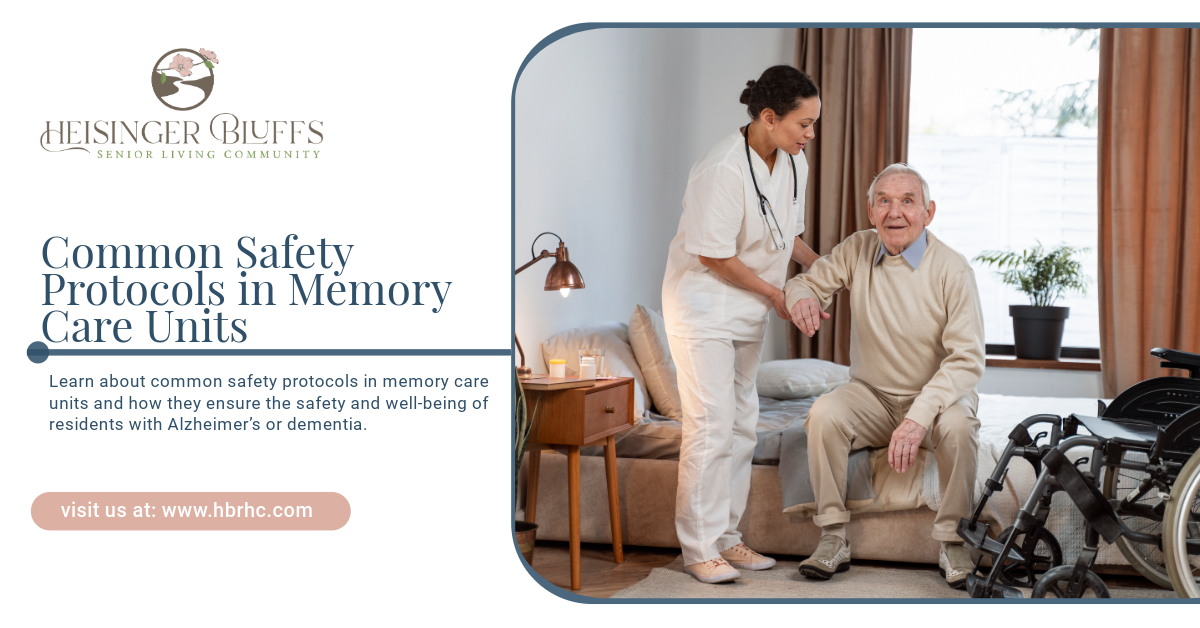Assisted Living Options for Parkinson’s Patients in Jefferson City, Missouri

Understanding Assisted Living in Jefferson City, MO
For caregivers and family members of seniors with specific health conditions like Parkinson's, understanding the options available for assisted living in Jefferson City, Missouri is crucial. It's important to discern the differences between assisted living communities and nursing homes, as well as to become familiar with the services that assisted living communities provide.
Assisted Living vs. Nursing Homes
Assisted living communities and nursing homes cater to different levels of care and support for the elderly. Assisted living is designed for older adults who are mostly active but require assistance with Activities of Daily Living (ADLs), such as bathing, dressing, and toileting. These communities aim to foster a strong sense of community and focus on keeping residents healthy, socially engaged, and as independent as possible.
| Care Type | Assisted Living | Nursing Homes |
|---|---|---|
| Medical Assistance | Limited | Extensive |
| ADL Support | Yes | Yes |
| Independence Level | High | Low |
| Social Engagement | High | Moderate |
Nursing homes, on the other hand, are intended for individuals who require full-time monitoring and medical assistance, offering a higher level of care for those who do not need hospitalization. They provide more advanced medical services and have a significantly higher number of medically trained staff compared to assisted living communities.
Services in Assisted Living Communities
Assisted living communities offer a wide array of services aimed at keeping their residents healthy and active. These services typically include:
- Personal care assistance with ADLs
- Medication management
- Housekeeping and laundry
- Meal preparation and dining services
- Social programs and activities
- Transportation services
- Fitness and wellness programs
- 24-hour security and staff availability
The goal of these services is to provide a supportive living environment where seniors can maintain a quality of life that is as independent as possible while still receiving the care that they need. These communities are not only a solution for senior living for Parkinson's patients but also for individuals with other conditions such as dementia, Alzheimer's, arthritis, and diabetes. It is essential for caregivers and family members to consider these services when selecting an assisted living facility to ensure that it aligns with the specific needs of their loved ones.
Assisted Living for Parkinson's Patients in Jefferson City
Assisted living facilities provide supportive care and an environment designed to maintain the quality of life for individuals with varying needs, including those with Parkinson's disease (PD). Tailoring the environment and care for Parkinson's patients requires understanding the unique challenges they face and identifying the key aspects that can contribute to their well-being.
Challenges and Considerations
Individuals with Parkinson's disease often face a multitude of challenges that must be considered when exploring assisted living options. The progressive nature of PD can affect motor skills, balance, and coordination, making daily activities increasingly difficult. Additionally, non-motor symptoms such as mood disorders, sleep disturbances, and cognitive changes can also manifest, requiring specialized attention and care.
Given these challenges, it's crucial to find an assisted living facility that not only provides help with day-to-day activities but also strives to promote independence and social engagement. Services and amenities that focus on physical therapy, exercise programs, and cognitive stimulation are particularly beneficial for PD patients.
Furthermore, the staff's understanding and training in managing the symptoms of Parkinson's disease are paramount. This knowledge ensures that they can offer appropriate support and adapt to the changing needs of residents as the condition progresses.
Finding the Right Fit
Selecting an assisted living facility that specifically caters to people with Parkinson's disease is rare, but there are certain aspects to consider to ensure the best possible fit. When evaluating potential communities, it's important to assess:
- The level of experience the staff has with Parkinson's patients.
- The availability of physical and occupational therapy services.
- The presence of exercise and wellness programs tailored to PD.
- The facility's approach to medication management.
- The ability to accommodate dietary needs and considerations, as nutrition plays a role in managing PD symptoms.
- The adaptability of the living spaces to ensure safety and accessibility as mobility changes.
- The opportunities provided for social interaction and community involvement.
Many assisted living communities offer homelike apartments or suites with amenities like pools, libraries, beauty salons, and movie theaters. These amenities are not just luxuries; they play a crucial role in keeping residents healthy, socially engaged, and as independent as possible.
For caregivers and family members searching for the right community, it's important to extend your search to specialized care options, such as senior living for dementia patients, senior living for Alzheimer's patients, senior living for arthritis patients, and senior living for diabetes patients, as these may offer the comprehensive care needed for someone with Parkinson's.
By carefully considering the unique needs of a person with Parkinson's disease and asking the right questions, families can find an assisted living facility that offers the right balance of support, care, and independence.
Financial Aspects of Assisted Living in Jefferson City, MO
When considering assisted living options for Parkinson's patients, the financial component is often a primary concern for caregivers and family members in Jefferson City, Missouri. Understanding the costs associated with assisted living and knowing how to plan for these expenses is essential for making informed decisions.
Costs and Coverage
Assisted living facilities offer a range of services, including personal care assistance and support with daily activities, which are particularly beneficial for those with Parkinson's disease. However, it's crucial to recognize that Medicare typically does not cover room and board expenses or personal care costs at these facilities. Similarly, Medicaid coverage for these costs varies by state and often does not extend to assisted living expenses. As a result, individuals and families usually need to rely on personal income, assets, savings, Veterans benefits, or long-term care insurance to fund assisted living care.
The cost of treating Parkinson's disease (PD) in the United States is substantial, estimated to be $14 billion annually, with indirect costs conservatively adding an additional $6.3 billion each year. These figures highlight the importance of financial planning for long-term care.
Planning Ahead
Due to the significant costs associated with assisted living, planning ahead is of utmost importance. Starting early allows families to explore various financial resources and make the necessary arrangements to ensure that their loved ones receive the appropriate level of care.
Here are some steps to consider when planning for assisted living expenses:
- Review personal finances, including income, assets, and savings.
- Explore eligibility for Veterans benefits, which may help cover some costs.
- Consider purchasing long-term care insurance before the need arises.
- Investigate state-specific Medicaid programs and their coverage for assisted living.
- Consult with a financial advisor or eldercare planner to understand all available options and create a tailored financial strategy.
By addressing the financial aspects of assisted living proactively, caregivers and family members can reduce the stress and uncertainty associated with managing the costs of care for loved ones with Parkinson's disease. For more information on senior living options catering to specific health conditions such as dementia, Alzheimer's, arthritis, and diabetes, be sure to explore our comprehensive resources.
Selecting an Assisted Living Facility for Parkinson’s Patients
When seeking the best assisted living for Parkinson's patients, it is crucial to meticulously evaluate potential facilities to ensure they meet the specific needs of individuals with Parkinson's disease. The selection process involves thorough preparation for visits and knowing the right questions to ask.
Preparing for Visits
Planning visits to assisted living facilities is a step that should not be rushed. To start, gather a list of recommended facilities from reliable sources such as doctors, friends, family, support groups, and community organizations. Before the visit, it's beneficial to involve an Aging Life Care Expert or a family member who can provide valuable insight during the assessment process.
It's advisable to plan ahead and visit facilities even before the immediate need arises. This proactive approach allows families to familiarize themselves with the options available in Jefferson City, Missouri, and to make an informed choice without time pressure.
Checklist for Preparing for Visits:
- Compile a list of facilities with good reputations.
- Schedule visits to each facility for a comprehensive tour.
- Involve an expert or knowledgeable family member in the process.
- Create a list of personalized needs and preferences.
Key Questions to Ask
During visits to assisted living facilities, asking the right questions is essential to determine if the environment and services provided are suitable for a Parkinson's patient. Here are some critical questions to consider:
- What level of care and support is available for Parkinson's patients?
- How does the staff manage medication and therapy sessions?
- Are there specialized programs or activities for residents with Parkinson's?
- Can the facility accommodate the progressive nature of Parkinson's disease?
- What is the ratio of staff to residents, and what are their qualifications?
- How are emergencies and health issues handled, especially those specific to Parkinson's?
- What types of social and recreational activities are offered?
- Are the common areas and private rooms designed to accommodate mobility issues?
- How are dietary needs and preferences catered to, considering the unique needs of Parkinson's patients?
It's also prudent to inquire about other health conditions that the facility may cater to, such as senior living for dementia patients, senior living for Alzheimer's patients, senior living for arthritis patients, and senior living for diabetes patients, as these may be relevant for comprehensive care planning.
By thoroughly preparing for visits and asking key questions, caregivers and family members can make an informed decision when selecting an assisted living facility that best accommodates the unique requirements of Parkinson's patients, ensuring a supportive and nurturing environment for their loved ones.
Adapting Home for Safety in Jefferson City Assisted Living Communities
Creating a secure and accommodating environment is crucial for individuals with Parkinson's disease to live safely and comfortably. This section provides insights on how to modify a home to enhance safety and facilitate daily activities for those with Parkinson's.
Creating a Safe Environment
The goal of adapting a home is to minimize the risk of Parkinson's disease (PD)-related injuries, especially given the mobility and vision challenges often associated with the condition. To create a safe environment, consider the following:
- Remove tripping hazards such as loose rugs and clutter from walkways to prevent falls.
- Ensure adequate lighting throughout the home, particularly in stairways and nighttime pathways.
- Install grab bars and railings in critical areas, including the bathroom and alongside stairs.
- Choose furniture with rounded edges and secure heavy furniture to the wall to prevent tipping.
According to the
Parkinson's Foundation, falls in the bathroom are a common concern, so it's essential to address issues like poor lighting, wet surfaces, and tripping hazards. Consider using non-slip mats in the shower and next to the tub, as well as a raised toilet seat with armrests to aid in sitting and standing.
| Room | Safety Modifications |
|---|---|
| Bathroom | Non-slip mats, grab bars, raised toilet seat |
| Kitchen | Lowered countertops, slide-out shelving |
| Bedroom | Bed rails, touch-activated lamps |
| Living Areas | Clear walkways, secure area rugs |
Assistive Devices and Technology
The use of assistive devices and technology can significantly enhance safety and independence for those with Parkinson's. Some recommended modifications and devices include:
- Motion-sensor lights that automatically illuminate when movement is detected.
- Voice-activated home systems for controlling lights, locks, and thermostats.
- Emergency response systems that allow individuals to call for help with the press of a button.
- Kitchen tools with easy-grip handles and automatic shut-off features.
It is advisable to consult with a doctor or occupational therapist to determine the most appropriate assistive devices for your specific needs. They can also help create an emergency plan for situations such as falls, ensuring a quick and efficient response.
By implementing these safety features and utilizing assistive technology, caregivers and family members can help ensure that their loved ones with Parkinson's can continue to live independently with confidence. For more information on senior living options catering to specific health conditions such as Alzheimer's, arthritis, or diabetes, explore our comprehensive guides.
Supporting Parkinson's Patients in Assisted Living Facilities
Supporting individuals with Parkinson's disease in an assisted living setting involves addressing not just their physical needs but also ensuring their nutritional intake and emotional well-being are well managed. Let's delve into the considerations for dining and the emotional support necessary for enhancing the quality of life for Parkinson's patients.
Dining Considerations
For those with Parkinson's, proper nutrition is key to maintaining overall health and can even aid in combating the disease. Assisted living communities typically provide well-balanced diets that can be tailored to the specific dietary requirements of residents with Parkinson's.
When considering an assisted living facility, it's crucial to assess the menu and ensure they can accommodate special dietary needs. This might involve arranging a meeting with the director of food services or the executive chef to discuss meal planning for residents with Parkinson's. Important factors include the ease of eating for those with tremors or dysphagia, the nutritional content of meals, and the ability to adjust meal times in line with medication schedules.
| Consideration | Description |
|---|---|
| Menu Assessment | Evaluate for nutritional balance and suitability for Parkinson's patients |
| Special Dietary Needs | Ability to cater to specific health-related dietary restrictions |
| Mealtime Coordination | Aligning meal times with medication schedules for optimal absorption |
Families and caregivers may find valuable information about dietary accommodations by visiting resources like senior living for diabetes patients, which offer insights into managing chronic conditions through diet in a senior living context.
Addressing Emotional Well-being
Emotional health is a significant aspect of care for individuals with Parkinson's, as nearly half of them may experience depression or anxiety, leading to isolation or loneliness. Assisted living communities can play a vital role in providing emotional support through various activities designed to engage residents and foster a sense of community.
Activities such as adaptive fitness classes, gardening, social clubs, cooking classes, or even casual social gatherings can help residents connect with others, find new hobbies, and feel less isolated. These engagements are essential in maintaining a positive outlook and can significantly improve the emotional well-being of Parkinson's patients.
Assisted living facilities should be evaluated for their approach to emotional support, with an emphasis on:
- A range of activities that cater to different interests and abilities
- Opportunities for residents to form meaningful connections
- Support groups or counseling services to address mental health concerns
For further guidance on how assisted living facilities can support individuals with specific health conditions, readers may refer to articles such as senior living for dementia patients and senior living for Alzheimer's patients, which explore the nuances of care for those with cognitive impairments.
By addressing both dining and emotional well-being, assisted living for Parkinson's patients can provide a supportive environment that not only cares for their physical symptoms but also nourishes their mind and spirit.












